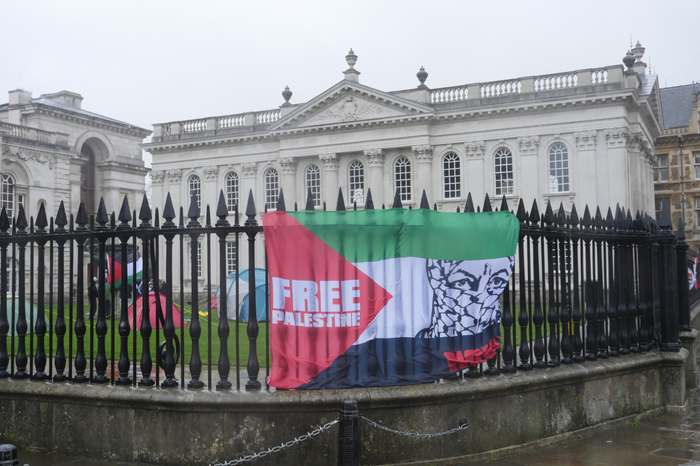Pro-Palestine protesters threaten to disrupt graduations following re-occupation
Cambridge for Palestine was joined by the University and Colleges Union among others to protest as part of a national day of workplace action

Pro-Palestinian students are threatening to disrupt graduations this weekend after a new encampment was set up on Senate House Lawn earlier this week.
Cambridge for Palestine (C4P) held a rally outside Senate House and the Old Schools faculty yesterday (28/11) as a part of a national day of workplace action.
Students were joined by the University and Colleges Union (UCU), alongside representatives from the National Education Union, and Unite the Union.
During yesterday’s event, one member of C4P said they will disrupt graduations if the University does not agree to their demands. They claimed it would be justified and in honour of “all the Palestinian students” the University’s complicity in “genocide” had affected.
This comes after the group occupied Senate House lawn on Wednesday, claiming that they would not leave until the University answered their demands to re-establish the original working group, disclose their investments in arms companies, and drop the IHRA definition of antisemitism.
Student members of C4P also occupied Greenwich House, a University administrative building last Friday (22/11), claiming it as a “new liberated zone for Palestine” and referring to it as “Kanafani House”.
C4P have also stressed the need for “public accountability in the form of an open hall” between Cambridge’s Investment Management team, administrators, and additional members of the University community to make “meaningful steps towards divestment”.
The group previously disrupted general admission graduations in June this year after occupying Senate House lawn, leading to the ceremonies being moved to Downing College.
Michael Aberton, President of the Cambridge UCU branch, joined students in criticising the University, stating that he was “livid, and disgusted that we have to stand out again […] and that students are having to occupy again”.
Protesters later marched from Great St Mary’s to Sidgwick Site, Cambridge’s campus for humanities, where increased University security was positioned. The march was followed by a teach-in at Little Hall in Sidgwick Site.
At the teach-in, an academic from the University of Gaza spoke on Cambridge’s role in the “scholasticide” in Gaza, commenting on the destruction of all 12 universities in Gaza following attacks from the Israeli military.
Speaking on Cambridge, he said: “As a leading university in the world, [Cambridge] has a moral obligation to take action against the genocide”.
He explained that Cambridge does not “need to bring people here,” instead urging the University to “support the resilience and steadfastness of the academics and the students in Gaza”.
A student from Trinity College also spoke at the teach-in. He stated that the College is “complicit” in the “Israeli bombardment of Gaza”. “It’s been rather shocking how slow the progress is [and the] apathy that the College Council has shown,” he added.
Speaking on Trinity’s individual investments, he criticised the College’s relationship with Elbit Systems, a company which produces 85% of the drones and land-based equipment used by the Israeli military. “Those drones are used to bomb houses, murder children, women, and men,” he stated.
The final speaker, an academic from the University’s Maths department, reiterated the need for “divestment from arms” at the University and transparency regarding its investments. He also stated that the University’s leadership should feel “shame,” adding that “we have to shame the management” when addressing the hall.
Support from the UCU comes after the group issued a statement in support of Cambridge for Palestine’s demands earlier this week. The statement claimed that Cambridge was “profiting from war crimes and genocide” and called on the University to cut ties with companies associate with Israel.
The UCU also called on the University to “reinstate the 12-person task force” that was originally established over the summer as a part of a promised arms review.
The University had agreed to review their policy on arms investments last summer following months of pressure from C4P, including an encampment outside King’s College.
This encampment was first set up in May, calling on the University to disclose its holdings in companies associated with Israel and to subsequently divest from them. C4P had stated they would not leave the site until their demands were met.
Following an agreement with the University, the encampment disbanded on the basis that the University would set up a student-led taskforce to aid in reviewing investments.
However, the University has since been accused of “watering down” the proposals, after they delayed this review until the end of the academic year, and allegedly changed the structure of the taskforce to only have two students.
This led to significant criticism from members of the University, with Caius fellow and member of University Council Professor Jason Scott Warren telling Varsity that he fears Cambridge “may be watering down undertakings made to students at the encampment”.
 Features / Cloudbusting: happy 10th birthday to the building you’ve never heard of30 March 2025
Features / Cloudbusting: happy 10th birthday to the building you’ve never heard of30 March 2025 News / Uni offers AI course for Lloyds employees30 March 2025
News / Uni offers AI course for Lloyds employees30 March 2025 News / Caius clock hand returned nearly 100 years after student prank31 March 2025
News / Caius clock hand returned nearly 100 years after student prank31 March 2025 News / Hundreds of jobs to be cut at Cambridge University Hospitals1 April 2025
News / Hundreds of jobs to be cut at Cambridge University Hospitals1 April 2025 News / Ski mask-wearing teens break into Caius accommodation27 March 2025
News / Ski mask-wearing teens break into Caius accommodation27 March 2025





